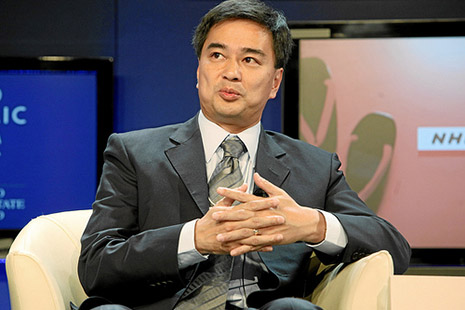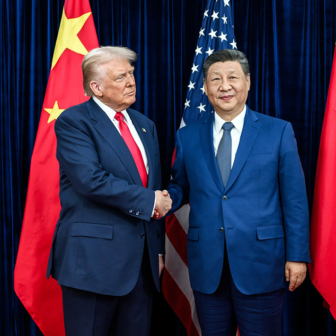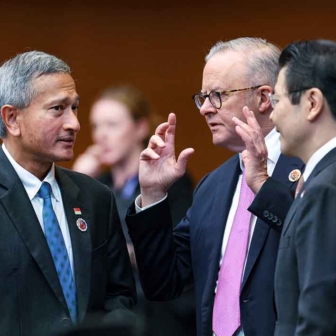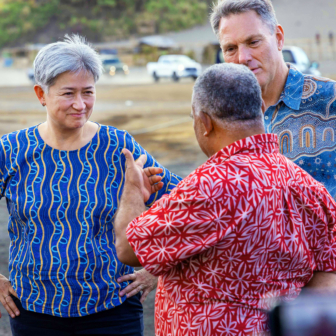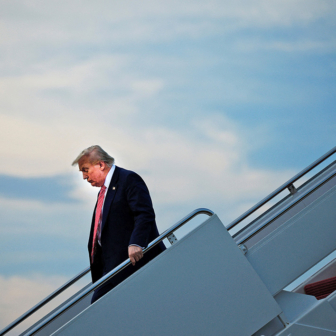THAI POLITICS has been out of the news since the bloody crackdown on the red-shirt protesters three and a half months ago. But any superficial tranquillity hides the ongoing campaign by the government of Prime Minister Abhisit Vejjajiva to neutralise the political opposition and maximise the vote for his Democrat Party at the election due next year.
The state of emergency declared in May has been wound back, but is still in force in Bangkok and in several red-shirt heartland provinces in the rural northeast. Hundreds of red-shirt protesters, including most of the leadership group, are in prison awaiting trial on charges that range from illegal assembly to terrorism. Community radio stations, which were a vital mouthpiece for the red-shirt cause, have been closed down. Reports from the provinces talk of police and military harassment of red-shirt supporters. And, in a bizarre turn, the government recently called on university rectors to monitor student performances that may have inappropriate political content. The red-shirt supporters of deposed former Prime Minister Thaksin Shinawatra are finding it difficult to get their opinions heard.
Despite the crackdown, some expressions of political discontent cannot be avoided. In late July, the government faced a by-election in Bangkok, brought about by the death of one of its MPs. This was an unwelcome test of the electoral waters for Prime Minister Abhisit. Since the end of the red-shirt protests in May, he has embarked on a high-profile public-relations campaign for national reconciliation. The prospect of political divisions finding new expression at the ballot box was deeply disconcerting.
The by-election stakes were raised even further when the opposition Pheua Thai party nominated one of the imprisoned red-shirt leaders as its candidate. Offering voters the choice of an opposition figure whom the government had labelled a terrorist ensured that the poll would be seen as a referendum on Abhisit’s handling of the political confrontation. With more than eighty red-shirt protesters killed by security forces in April and May, passions were running high.
On Thailand’s electoral map, Bangkok is often seen as a stronghold of the Democrat Party and as unfavourable ground for the pro-Thaksin opposition forces. But the support for Abhisit and his colleagues is not uniformly spread across the vast capital and they are vulnerable on the less-affluent outskirts where the by-election took place. Indeed, many observers have expressed surprise at the strength of support shown for red-shirt protesters by Bangkok residents. The by-election was a very real contest for the government and one that it was determined to win, and win well, in order to shore up its battered legitimacy.
Once the votes were counted, the result was sufficiently close for both sides to claim success. The government’s candidate won the election with about 54 per cent of the vote. Abhisit had survived an important electoral test. And a bomb blast on the night of the poll gave him the perfect pretext to turn the discussion back to security and reconciliation. The opposition candidate scored about 46 per cent – a defeat, but certainly not a disgrace. In fact, some supporters asserted a moral victory for a candidate who had been publicly vilified as a terrorist and whose campaign was clearly handicapped by his incarceration. The anti-red-shirt backlash that had been predicted in response to their torching of a major Bangkok shopping centre had not eventuated. If the red shirts could get 46 per cent in Bangkok, they would win many seats in the rural north and northeast where about half of Thailand’s constituencies are located.
Taking a longer-term view of Thai politics, the government’s modest by-election result was unsurprising. The last time Prime Minister Abhisit’s Democrat Party won the most seats in a general election was in 1992. It was defeated by Thaksin Shinawatra in 2001 and humiliated by him in 2005. Facing the Thaksin landslide in 2005, the Democrats ran on an “anti-extinction” platform, hoping to win enough seats to remain at least a credible opposition force. When Thaksin called a snap election in 2006, the Democrats boycotted the poll because they knew they would lose. In the election of 2007, fifteen months after Thaksin had been forced into exile by a military coup, the Democrats won only 165 seats in the 480-seat parliament.
Abhisit managed to become prime minister in late 2008 only after the courts dissolved the pro-Thaksin governing party in the wake of the royalist yellow shirts’ occupation of Bangkok’s airport. Abhisit makes much of the parliamentary majority he now commands, but the electoral record of his Democrat Party over the past decade has been very ordinary.
Given this history, the Democrat Party’s trepidation about future elections is understandable. A central demand of the red-shirt protesters was that Abhisit call a general election to test his government’s legitimacy. With central Bangkok gridlocked, Abhisit was persuaded to offer an election for November 2010. Some red-shirt leaders didn’t trust his sincerity and demanded that he nominate a date on which parliament would be dissolved. The deal, if ever there was one at such a chaotic time, collapsed. In the wake of the dispersion of the red shirts, talk of an early election is now off the table. According to the constitution, an election is due by the end of 2011 and Abhisit will probably hold on to power for as long as he possibly can.
In the meantime, he and his government have some major challenges to address. High on his agenda is protecting Thailand’s monarchy. Since the coup that deposed Thaksin Shinawatra in September 2006, the monarchy has found itself increasingly embroiled in Thailand’s colour-coded political divisions. Many see the coup as the handiwork of figures close to King Bhumibol Adulyadej, especially his trusted confidant and Privy Council power-broker, General Prem Tinsulanonda. In 2008, yellow-shirt protesters, campaigning under the banner of the king, were instrumental in bringing about the downfall of the pro-Thaksin government elected in 2007. The royalist yellow shirts have pushed for a more limited form of democratic rule where a majority of parliamentarians would be appointed, rather than elected.
For much of this period the king himself has been in frail health and rarely seen in public. He never publicly endorsed the yellow-shirt campaign but nor did he, or his confidants, make any attempt to voice disapproval about increasingly anti-democratic uses of the royal brand. Queen Sirikit has been much more open in her support for the anti-Thaksin forces. A pivotal moment in public perceptions of the monarchy came when she attended the funeral of a yellow-shirt protester killed in a violent clash with police. In a powerful blow to the palace’s carefully cultivated imagery, Thailand’s queen stood shoulder-to-shoulder with yellow-shirt leaders who were calling for the forcible overthrow of an elected government.
Inevitably, royal entanglement in politics has generated comment, and some dismay, locally and ly. Abhisit has done whatever he can to keep a lid on the criticism. Among the many legal tools his government has enthusiastically deployed, the lèse majesté provision of the criminal code is the most potent. Lengthy jail terms have been handed to those who have challenged the supposed sanctity of the royal institution. Though Abhisit has paid lip service to calls for reform of this draconian law, his government has shown no sign of backing off from heavy-handed repression of free speech when it comes to royal matters. Soft power may also play a part. There is talk of Abhisit’s government funding a Thai studies centre in Australia, presumably in an attempt to get some more sympathetic discussion of sensitive issues.
Many observers agree that such heightened sensitivity is part of a drawn-out preamble to the even more anxious situation when the king dies. King Bhumibol has been in hospital since September 2009 and is now very rarely seen. The public consensus is that his only son, Crown Prince Vajiralongkorn, will take the throne when he dies. Repeated comments from well-placed sources within the government have reinforced the understanding that this is the logical and inevitable path of succession. What this consensus is designed to ignore is that Vajiralongkorn remains deeply unpopular and that his younger sister, Princess Sirindhorn, may still be the preferred heir among some senior figures within the Thai elite. The widespread circulation of revealing images of Vajiralongkorn’s wife suggests that there may be people very close to him who are keen to undermine his public credibility.
It is hardly surprising that these succession anxieties and tensions have emerged towards the end of the king’s sixty-four-year reign. Some commentators suggest that Abhisit’s primary role is to provide a relatively stable and royalist government while the palace succession is resolved. Royal power-brokers do not want an electorally powerful figure like Thaksin meddling in such delicate matters. The danger for Abhisit is that he may find himself redundant once royal power plays are concluded. Or he may find himself on the wrong side of divisions within the sprawling royal network. Worst of all for Abhisit and the Democrats, the death of the king may lead the palace to take a more conciliatory attitude towards Thaksin himself, perhaps even paving the way for his return to Thailand and political rehabilitation.
ABHISIT’S ROYAL concerns are compounded by reconfigurations within the Thai security forces. In the 1990s, when the Democrats were last in power, it looked like the generals had returned to the barracks once and for all. The massacre of pro-democracy protesters in 1992 had seriously damaged the army’s status and there was a strong feeling that an overt political role for men in uniform was no longer socially acceptable.
This all changed in September 2006 when the unexpected anti-Thaksin coup removed the Democrat Party’s most formidable political opponent. Since then, the army has continued to play a crucial role in bringing Abhisit to power and keeping him there. The army’s refusal to move against the yellow-shirt airport occupation in 2008 sealed the fate of the Thaksin-aligned government that had been formed after the 2007 election. And some high-level military arm-twisting helped Abhisit to cobble together his current parliamentary majority. Earlier this year there were tensions between Abhisit and his army chief about how the red-shirt protesters should be managed, but the army eventually deployed formidable force to break up the two-month occupation of central Bangkok.
It’s no coincidence that the military budget has almost doubled since the 2006 coup and is rising faster than in other countries within the region. Abhisit’s latest budget continues the trend, despite vigorous opposition protests, and the army is now calling on the government to increase its forces in the red-shirt heartlands of the north and northeast. Abhisit is riding on the back of a very hungry tiger.
What makes this situation even more dangerous is that royalist forces now seem to have the inside track when it comes to military promotions. There is nothing new about the value of palace endorsement, but since the coup of September 2006 strong palace loyalists have enjoyed great success in their careers. The current army chief, Anupong Paochinda, has remained close to royal power, particularly through his leadership of the Queen’s Guard. His successor, General Prayuth Chan-ocha, has also been a commander of the Queen’s Guard, and both men are former commanders of the 1st Army Division, part of the force that led the bloody crackdown on the red-shirt protesters. As her public backing for the yellow shirts demonstrated, the queen is something of a loose cannon in the palace, and these military links show that she may be a cannon with considerable calibre.
Most hazardous for Abhisit is the risk that the promotion of royally favoured figures may open tensions within the army. In April this year, a military officer close to the queen was killed in a grenade attack during a confrontation with red-shirt protesters. There are strong rumours that this may have been the work of rogue elements within the army who are disgruntled at the favour shown to some factions. The last thing Abhisit wants, as he faces a challenging security situation – not only in Bangkok and the red-shirt provinces, but also in the restive far south – is division within his security apparatus.
Abhisit will also be losing sleep over the continuing activism of the yellow shirts and their newly established political wing, the New Politics Party. Abhisit has always been cautious about aligning himself too closely with the yellow shirts, even though their airport occupation helped lever him into the prime ministership. Since then, Abhisit has found himself under attack from key yellow-shirt leaders who see him as too cautious in his handling of the pro-Thaksin forces. The latest point of disagreement concerns relations with Cambodia. Some of the more rabidly nationalist yellow shirts have sought to engineer a destabilising confrontation with Cambodia over an ancient temple complex on the border. Abhisit has talked tough to the Cambodians in an attempt to mollify the vocal and well-organised yellow shirts. So far, to his credit, he has avoided bloodshed, even though a short border war might serve to distract attention from his other political challenges.
An electoral clash with the yellow shirts could be disastrous for Abhisit. It is unlikely that their New Politics Party would attract mass electoral support, but it may steal enough votes from the Democrats to deliver a swag of new parliamentary seats to the opposition. New Politics considered running in the recent Bangkok by-election, but had second thoughts. If it had run, it is very likely the Democrat vote would have been reduced enough to put the imprisoned red-shirt leader into parliament. In Thailand’s first-past-the-post election system, Abhisit simply cannot afford to have his electoral base undercut by the yellow-shirt forces who helped bring him to power.
One of Abhisit’s most important political assets is the perception that he is one of the “good men” in Thai politics. Abhisit is young, urbane, well-educated and untainted by business dealings. He has sufficient credibility and charisma to represent the ideal of a loyal official, dedicated to serving his country and guiding it through difficult times. There is a common mantra in Thai politics, particularly among the more conservative elite, that good men alone are required to manage national affairs. Abhisit himself has mobilised several committees of such good men (and a few women) to work through the process of national reconciliation which, he insists, must follow the violent confrontation with the red shirts. National unity must be restored by seeking wise and ethical counsel.
But this preoccupation with good men is naive at best and deeply cynical at worst. Thailand’s recent political history demonstrates that it has to learn to deal with the full spectrum of political behaviour. The long reign of the widely respected king has helped create a perception that goodness is essential for national unity and prosperity. This perception will be hard to maintain if Crown Prince Vajiralongkorn takes the throne or if palace divisions spill out into the public arena. It will be a hard message to sell if an increasingly assertive army flexes its muscles against opposition groups. Appeals to goodness may start to be drowned out if the yellow shirts keep muddying national virtue with aggressive xenophobia. Ethical virtue may be of little interest to a new generation of red-shirt leaders, hardened by the bloody events in Bangkok. And talk of goodness may evaporate completely if Thaksin Shinawatra finds a way to return to Thailand and resurrect his political career. Thaksin is more electorally popular than any good man ever was.
Thai politics would be simple if it only involved good men. Abhisit’s key challenge is not to mobilise even more of them, but to help Thailand develop strong democratic institutions that can cope with the machinations of the good, the bad and the ugly. •
